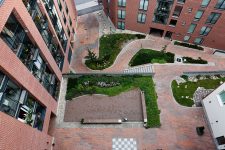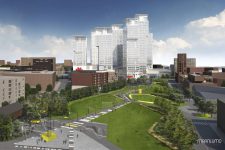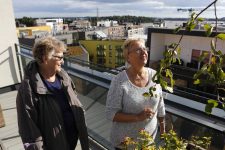Category: News
How Flexi Spaces work as a living lab
Helsinki Smart City evolves with climate positive pilots

Agile piloting accelerates development of resource-efficient urban lifestyles in Kalasatama smart district The Smart Kalasatama project underway in a new Helsinki inner-city district proceeds with agile piloting: five climate positive pilots focus on smart city parking and electric car charging, resident-generated solar power, urban green solutions, and the carbon footprint of households. The Kalasatama district is under construction at the site of a former commercial harbor. The City of Helsinki has designated the district as a platform for smart city development, Smart Kalasatama, involving new digital services to ease the lives of residents. One of the goals and benchmarks of>>>
Open Living Lab Days 2017 – Join us in Krakow on 31st of August
Date: Thursday 31.8 Time: 13.45 Venue: Open Living Lab Days, Krakow Technology Park Workshop: Co-creating services for smart cities – models, processes and ecosystems Workshop is organised by Smart Kalasatama Team and Laurea University of Applied Sciences Smart services are often created by several players and they require a wider ecosystem. The service ecosystem can be further developed during piloting phase together with the different stakeholders linked or engaged in the co-creation of the services. We have learnt that the co-creation events organised in the context of the pilots serve to engage and build a wider ecosystem. During this workshop,>>>
The next steps in Smart Kalasatama district

What shall be the next steps in Smart Kalasatama district to make it even smarter and more sustainable? Read a report of what 40 European sustainability and smart city experts and Smart Kalasatama developers propose. The report summarizes the outcomes of a workshop organized together with EIT Climate KIC and Smart Kalasatama team. Kalasatama is part of EIT Climate-KIC Smart and sustainable districts network. Helsinki District Challenge – SSD report
Flexispace service model and how to apply it on temporary use

A smarter way to offer, book and use spaces is being developed and tested in Kalasatama, Helsinki. A big trend for smart cities is sharing economy, that covers different spaces: private, residential and public. Here we take a look at how this Flexispace model could be applied to temporary use (TU). Smart city development is also about opening the spaces. Flexispace project develops an ecosystem for space sharing, bringing together booking services, IoT technologies and flexible parking. At the same time, REFILL projects are searching new ways for making better use of empty buildings and spaces. How could Flexispace model>>>
How Flexi Spaces work as a living lab
Helsinki Smart City evolves with climate positive pilots

Agile piloting accelerates development of resource-efficient urban lifestyles in Kalasatama smart district The Smart Kalasatama project underway in a new Helsinki inner-city district proceeds with agile piloting: five climate positive pilots focus on smart city parking and electric car charging, resident-generated solar power, urban green solutions, and the carbon footprint of households. The Kalasatama district is under construction at the site of a former commercial harbor. The City of Helsinki has designated the district as a platform for smart city development, Smart Kalasatama, involving new digital services to ease the lives of residents. One of the goals and benchmarks of>>>
Open Living Lab Days 2017 – Join us in Krakow on 31st of August
Date: Thursday 31.8 Time: 13.45 Venue: Open Living Lab Days, Krakow Technology Park Workshop: Co-creating services for smart cities – models, processes and ecosystems Workshop is organised by Smart Kalasatama Team and Laurea University of Applied Sciences Smart services are often created by several players and they require a wider ecosystem. The service ecosystem can be further developed during piloting phase together with the different stakeholders linked or engaged in the co-creation of the services. We have learnt that the co-creation events organised in the context of the pilots serve to engage and build a wider ecosystem. During this workshop,>>>
The next steps in Smart Kalasatama district

What shall be the next steps in Smart Kalasatama district to make it even smarter and more sustainable? Read a report of what 40 European sustainability and smart city experts and Smart Kalasatama developers propose. The report summarizes the outcomes of a workshop organized together with EIT Climate KIC and Smart Kalasatama team. Kalasatama is part of EIT Climate-KIC Smart and sustainable districts network. Helsinki District Challenge – SSD report
Flexispace service model and how to apply it on temporary use

A smarter way to offer, book and use spaces is being developed and tested in Kalasatama, Helsinki. A big trend for smart cities is sharing economy, that covers different spaces: private, residential and public. Here we take a look at how this Flexispace model could be applied to temporary use (TU). Smart city development is also about opening the spaces. Flexispace project develops an ecosystem for space sharing, bringing together booking services, IoT technologies and flexible parking. At the same time, REFILL projects are searching new ways for making better use of empty buildings and spaces. How could Flexispace model>>>



